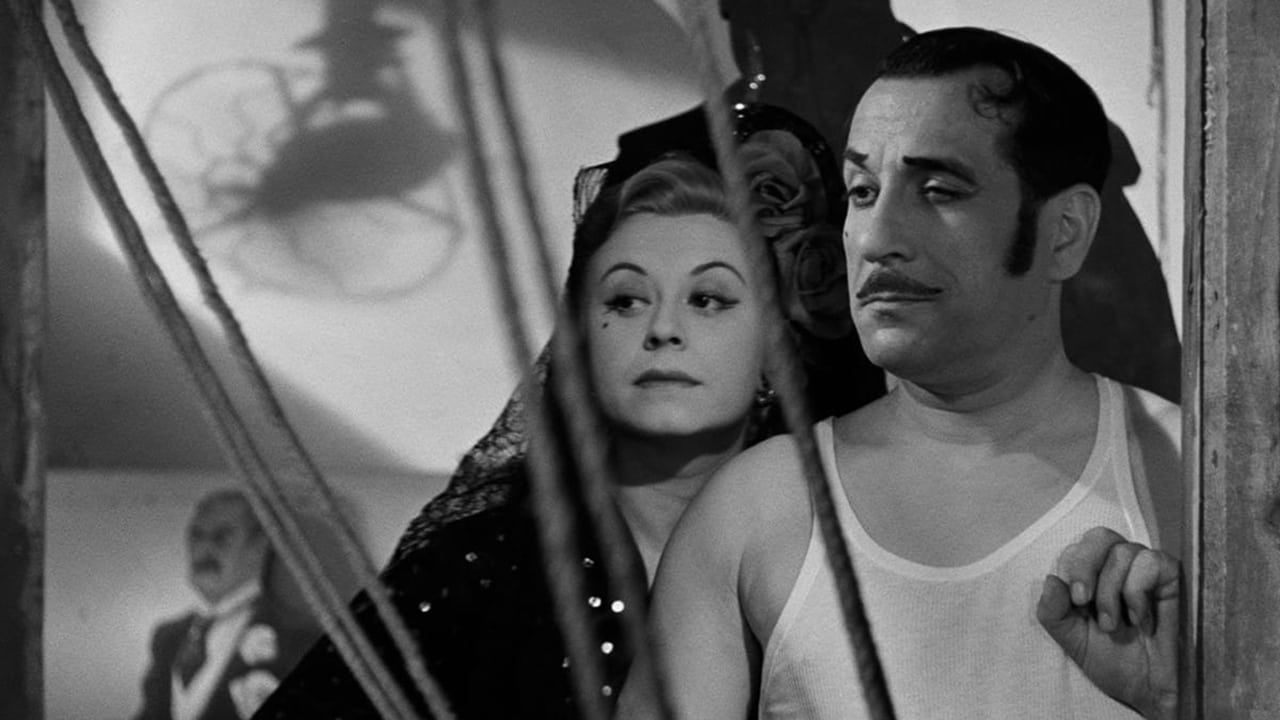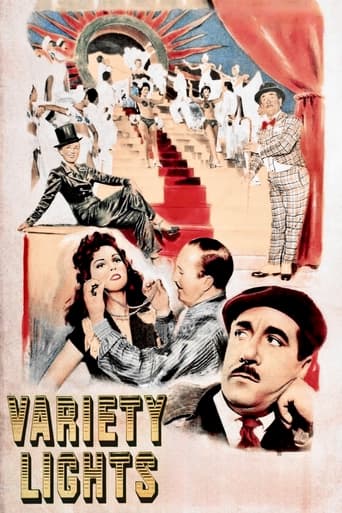MamaGravity
good back-story, and good acting
Reptileenbu
Did you people see the same film I saw?
Dynamixor
The performances transcend the film's tropes, grounding it in characters that feel more complete than this subgenre often produces.
Billie Morin
This movie feels like it was made purely to piss off people who want good shows
Cosmoeticadotcom
If you have ever wondered why Federico Fellini's film 8½ was called 8½, the reason is simple. It was the eighth full film he had directed, till that point, along with a ½ film credit, which was his debut effort, 1950's co-direction in the 97 minute long black and white film Variety Lights (Luci Del Varietà), along with Neo-Realist film directing veteran Alberto Lattuada. The film's story and screenplay, however, were both penned by Fellini, and the most manifest thing about the film is its similarity to the Hollywood film All About Eve, released the same year- albeit it is a bit grittier, more realistic and less melodramatically star-driven, and its influence on Fellini's own later La Strada, as well as presaging many Fellini trademarks and tics. It is not a great film, but a thoroughly enjoying light bit of entertainment. Before this film, Fellini had mostly worked as a screenplay writer and script doctor. His most well known contribution prior to this film was on Roberto Rossellini's Open City….despite their poverty and idiocy, selfishness and ill manners, the characters in Variety Lights are lovable and utterly human. They are not the grotesques and caricatures that would become Fellini's stock in trade in later years. They merely have to clutch to a goose, shrug an eyebrow, or yawn lazily on a divan, and the sense is that these are real people, not mere fictive characters. Even the camera lingers on them in soft hues, suggesting the empathy of the filmmakers'. The insider knowledge the film displays is classic Fellini territory, and despite being an ensemble film it is really the stellar acting of Peppino De Filippo that raises this film above mere schmaltz, which it could have become rather easily. No, it's not as deep nor poignant as Charlie Chaplin's Limelight, released two tears later- a film with similar themes and backgrounds, but it is a worthwhile film, and one that stands up to repeated viewings.
christophaskell
Master storyteller Fellini tried out his directing chops for the first time with ‘Luci del Varieta'. Creating a memorable cast of characters and memorable situations along the way, I think it's safe to say it was a very good first effort. Checco (Peppino De Filippo) is a frustrating man that thinks with everything except his head. An optimist first, the realities of his intentions are just short of ridiculous. Overall, Fellini handles the film with such a delicate humor, the actors are provided with every opportunity to flesh out their characters and make each one very unique. A simple story told well by the man who would go on to telling amazing stories. Rating: 28/40
jhclues
A young woman pursuing her dream of being on the stage, aligns herself with a traveling variety show band of performers in `Variety Lights,' directed by Federico Fellini (and assisted by Alberto Lattuada). Veteran comic actor Checco Dal Monte (Peppino De Filippo) and his troupe of performers are struggling to get by, living from hand to mouth and show to show, but it doesn't deter Liliana Antonelli (Carla Del Poggio), blinded perhaps by the stars in her eyes, from approaching Checco about joining his show. He turns her down-- they simply have no openings, and certainly no money-- but circumstances soon prevail on her behalf, and much to the chagrin of many of the other performers, she joins the troupe. The effect she will have on the show, and how it will influence her own life, remains to be seen at this point; but with Fellini at the helm, you know it's going to be an interesting ride. And it is. Fellini, a true visionary, is known for filling the screen with vivid images born of his own imagination, especially in his later films. But beyond the sometimes bizarre appearances, there is always an engaging story to be found at the heart of his films, and this one (his first) is no exception. And, though devoid of the surrealism he would use later on, in Checco's company there is something of the carnival motif present that Fellini would return to time and again during the course of his career, and of course, there's the story, presented with that unique Fellini touch and laced with his insight into the human condition, which at it's core is the real strength of the film. No matter what the subject matter, Fellini always had his finger on the emotional pulse of the material and had the innate ability to transfer what he felt to the screen. Very simply, he knew what worked and how to use it; within the images he presents, there can always be found a reflection of reality-- even amid the surreal-- and it's in his characters. Physically and emotionally, these are real people who run the entire gamut of human existence. Beyond his astounding visuals, it's his ability to cultivate that depth of his characters that makes Fellini special; the way they interact with, and relate to one another or the situations in which they find themselves. And by drawing out his actors, he always gives his audience someone with whom to identify on one level or another. As Checco, Filippo successfully taps into the humanity of the character, this aging performer with hopes and aspirations beyond his means or capabilities. He's a character with whom you can sympathize, but only to a point-- for you soon recognize his flaws and transgressions. But even then, you are still able to at least understand him. Most importantly, his performance is believable, and his Checco comes across as a very real person. Del Poggio gives a notable performance as well, as this young woman who makes the most of the opportunity with which she is presented. And as the story unfolds she develops her character extremely well; by the end of the film you know exactly who `Lily' is and what motivates her. In a memorable supporting role, it's the young Giulietta Masina, however, who steals the show as Melina Amour, Checco's girlfriend. She creates the one character in the film with whom you can truly empathize, and she does it with style. Masina has such a radiant, charismatic screen presence, that whenever she appears the eye is instinctively drawn to her. A gifted actress, she is exceptionally adept at expressing her emotions-- often by merely shifting her eyes-- and communicating with the audience. Few actors can say more or convey as much with their eyes or with a simple expression as Masina. And, sparse as it is, her performance here is alone worth the price of admission. The supporting cast includes Folco Lulli (Adelmo), John Kitzmiller (Johnny), Dante Maggio (Remo), Carlo Romano (Enzo) and Gina Mascetti (Valeria del Sole). Well crafted and delivered, `Variety Lights' is an engaging story, told in the same straightforward manner Fellini would later use in `La Strada' and `Nights of Cabiria.' The basic elements of the story may be familiar, but it's an entertaining film, and worth seeing, as it prophesies the triumphs of an artist who would soon be recognized as one of the world's master filmmakers: Fellini. I rate this one 7/10.
shinolah
In approaching any film of Fellini's, it is important not to clump his style in the same field of other European 'arthouse' filmmakers such as Bergman, Godard, Antonioni or even Tarkovsky.From what I understand after viewing a few of his films [namely 'La Strada', 'La Dolce Vita', 'Nights of Cabiria' and now 'Variety Lights'] Fellini draws deceptively simple metaphors and contexts from banal characters often at times, for instance Quinn as the strongman in "La Strada" who exploits the resources and emotions of a simple-minded farm girl and then finds his life imbued with a terrible guilt upon hearing of her death. He knows now that physical strength can no longer be a shield that he wields when life throws him the challenge of reaching out and caring. This is all delicately displayed by Fellini who basically draws these characters with very modest lives and shows their gradual moral breakdown. Unlike Bergman who will use intense, ambiguous and overtly intellectual dialogue showing a couples' slow disintegration, or Antonioni who will use a pantomimed tennis match to illustrate the uncertainty of an artist's future, Fellini simply gives us a glimpse into a common person's vocation and relates it to a much broader social and existential complex. I consider his early work to be representative of modern day filmmakers with a similar style such as Hal Hartley and Jim Jarmusch.In "Variety Lights" we are given a tale of small-time musicians, dancers, singers, and one naive but well-meaning owner who will do anything to get ahead in life and make his troupe of entertainers an instant success, eventually turning to the wrong people for assistance. This is all basically the back-drop of the owner's floundering marriage, which basically comes to a screeching halt near the end when he begs her for money to take another stab at the show once he's broke. The wife becomes less an endearing necessity of one man's livelihood and more an impetulant cashcow of sorts.The story is brilliantly written and touching and not overwrought in pretentious 'arthouse' silliness. This is why Antonioni ran out of steam shortly after "Blowup", he began to choke on his own tedious style. "Variety Lights" is not among Fellini's best films but there is nothing shameful about this, his directorial debut.Apparently Fellini fell into the mix of more ambiguous tones toward the mid-60's, which is fine. I'm all for experimentation so long as it maintains the delicate balance between art and bloated ambiguity.

